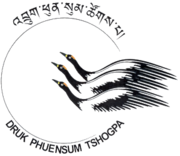Druk Phuensum Tshogpa (Dzongkha: འབྲུག་ཕུན་སུམ་ཚོགས་པ།; Wylie: 'brug phun-sum tshog-pa; translation: Bhutan Peace and Prosperity Party; abbr. DPT)[2] is one of the major political parties in Bhutan. It was formed on 25 July 2007 as a merger of the All People's Party and the Bhutan People's United Party,[3] which were both short-lived. The working committee of the merged entity, headed by the former home minister, Jigmi Yoezer Thinley, decided on the name for the new party. On 15 August 2007, Jigmi Yoezer Thinley was elected president of the party, and the party applied for registration, thus becoming the second political party in Bhutan to do so. On 2 October 2007, the Election Commission of Bhutan registered the party.[4] On 24 March 2008, the party won the first general election held in Bhutan. The party secured 45 of the 47 seats to the National Assembly.[5][6] The party tends to be more popular in the east of the country.[7]
Druk Phuensum Tshogpa འབྲུག་ཕུན་སུམ་ཚོགས་པ། | |
|---|---|
 | |
| Abbreviation | DPT |
| Leader | Dorji Wangdi |
| Founded | 25 July 2007 |
| Merger of | All People's Party Bhutan People's United Party |
| Headquarters | Chang Lam, Thimphu |
| Ideology | |
| Political position | Centre-right |
| Colors | Brown |
| Seats in the National Assembly | 0 / 47 |
| Election symbol | |
| Three Black-necked crane soaring high into the sky | |
2013 election edit
In the 2013 general election, while the DPT secured 15 seats, it lost the position of ruling party. In this election, People's Democratic Party won 32 seats and became the ruling party.[8] In July 2013 Jigme Thinley submitted the resignation for the Member of National Assembly before beginning its Legislative Session. So on 24 July of the same year Pema Gyamtsho, who is a former Minister of Agriculture and Forest, was appointed the Opposition Leader in NA for the Second Legislative Session.[9] On 3 December same year he was also elected as the new DPT's Party President.[10]
Election Results edit
National Assembly edit
| Election | First round | Second round | Seats | +/– | Outcome | ||
|---|---|---|---|---|---|---|---|
| Votes | % | Votes | % | ||||
| 2008 | 169,490 | 67.04% | Cancelled | 45 / 47
|
New | Supermajority | |
| 2013 | 93,949 | 44.52% | 114,093 | 45.12% | 15 / 47
|
30 | Opposition |
| 2018 | 90,020 | 30.92% | 141,205 | 45.05% | 17 / 47
|
2 | Opposition |
| 2023–24 | 46,694 | 14.91% | Did not qualify | 0 / 47
|
17 | Extra-parliamentary | |
See also edit
Notes edit
- ^ "Bhutan and its political parties". European Parliamentary Research Service. 27 November 2014. Retrieved 12 October 2017.
- ^ Matthew Rosenberg, "Royalist Party Wins Election in Bhutan", Associated Press, 24 March 2008. Archived 29 March 2008 at the Wayback Machine
- ^ "Druk Phuensuim Tshogpa, the new party in town". Archived from the original on 19 August 2011. Retrieved 25 December 2007.
- ^ Election Commission of Bhutan website-DPT Archived 4 March 2008 at the Wayback Machine
- ^ "Bhutan voters show their attachment to king". International Herald Tribune. Archived from the original on 27 March 2008. Retrieved 24 March 2008.
- ^ "Royalists Win Election in Bhutan". Time. Archived from the original on 1 May 2008. Retrieved 28 March 2008.
- ^ "Druk Thuendrel Tshogpa's plan to replace DPT in the east and then consolidate from the West and South to gain power in 2024". The Bhutanese. Retrieved 2 November 2022.
- ^ National Parliamentary Election 2013: General Elections Archived 1 June 2014 at the Wayback Machine, Election Commission of Bhutan Official Homepage. Retrieved 16 March 2014.
- ^ Dr. Pema Gyamtsho to head the OppositionBhutan Broadcasting Service (BBS), 24 July 2013. Retrieved 16 March 2014.
- ^ OL, the new DPT president BBS, 4 December 2013. Retrieved 16 March 2014.
External links edit
- "Official website". Archived from the original on 9 April 2008. Retrieved 16 April 2008.
- Druk Phuensum Tshogpa on Facebook